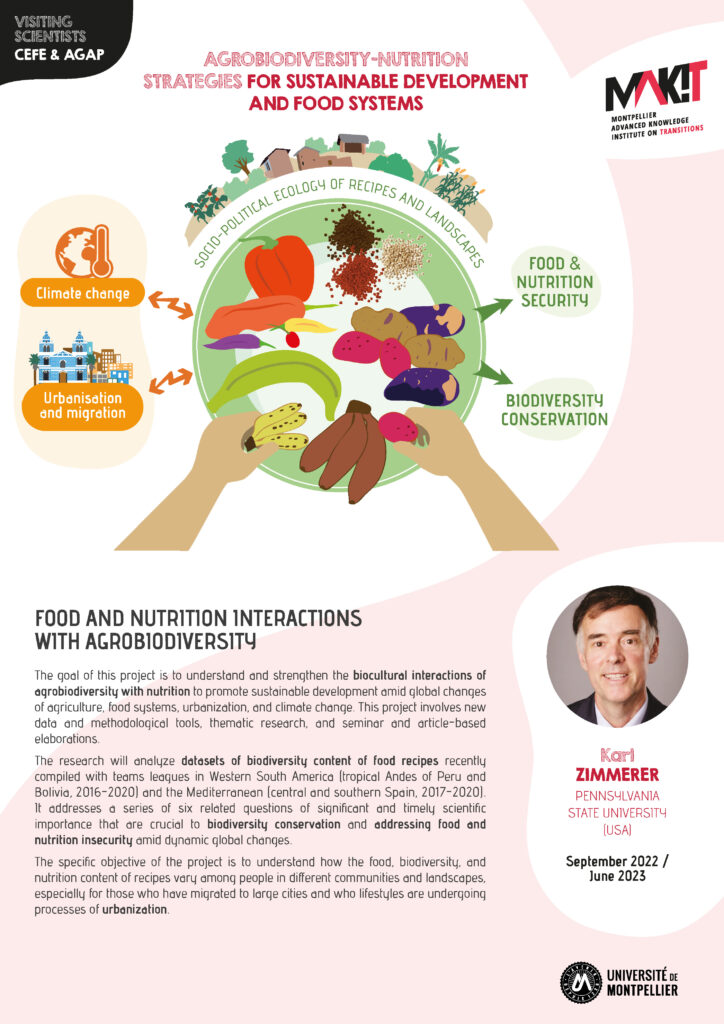Karl Zimmerer
Karl Zimmerer is the E. Willard and Ruby S. Miller Professor in the Department of Geography at Pennsylvania State University, with secondary appointments in Ecology and Sociology-Agricultural Economic-Education. He is the founding director of the GeoSyntheSES Lab and teaches at the undergraduate and graduate levels. Previously, Dr Zimmerer was Professor of Geography at the University of Wisconsin—Madison until 2007. He was appointed as a tenured member in the School of the Environment and Department of Anthropology at Yale University (2005). Dr Zimmerer’s scholarly and scientific career began at the University of California, Berkeley (Geography MA/PhD) and Antioch College (Biology/Physics BS).
His professional recognition includes the Guggenheim Fellowship (Geography/Environmental Studies), Fellow of the Geology and Geography section of the American Association for the Advancement of Science, and Robert McC. Netting and Melamid awards of the American Association of Geographers and the American Geographical Society. He has previously held fellowships at Harvard and Yale Universities as well as the Bellagio Center.
Seven books written and edited by Dr Zimmerer on the geographic dynamics of biodiversity, conservation, and sustainable development offer major contributions to scholarly, scientific, and solutions-oriented knowledge and debates. He has also authored more than 170 articles, chapters, and reviews placed in top scholarly and scientific journals and books.
Dr Zimmerer’s works advance analysis and models of sustainability and biodiversity conservation linked to food security, conservation, justice, and sustainable development including urbanization and migration, social and economic cooperation and conflict in land use and landscape models as well as in environmental policy and management. Each stream entails the theoretically and methodologically rigorous, innovative integration of the natural and social sciences.
The goal of this project is to understand and strengthen the biocultural interactions of agrobiodiversity with nutrition to promote sustainable development amid global changes of agriculture, food systems, urbanization, and climate change. This project involves new data and methodological tools, thematic research, and seminar and article-based elaborations.
The research will analyze datasets of biodiversity content of food recipes recently compiled with teams leagues in Western South America (tropical Andes of Peru and Bolivia, 2016-2020) and the Mediterranean (central and southern Spain, 2017-2020). It addresses a series of six related questions of significant and timely scientific importance that are crucial to biodiversity conservation and addressing food and nutrition insecurity amid dynamic global changes.
The specific objective of the project is to understand how the food, biodiversity, and nutrition content of recipes vary among people in different communities and landscapes, especially for those who have migrated to large cities and who lifestyles are undergoing processes of urbanization.

This symposium features a keynote presentation of new, original research on the dynamics and potential strengthening of biodiversity and food-nutrition (SDG2) amid the drivers and change processes of migration, urbanization, and climate change. This presentation will draw on stakeholder meetings conducted in Peru in January 2023 and Spain in September 2022. The keynote presentation is focused on research advances on interrelated sub-projects:
(1) historical dynamics of colonial geographies of biodiversity in food and agriculture (agrobiodiversity) entwined with monocropping and migration/urbanization in the Mediterranean and Latin America;
(2) analysis of resilience and its limits among three groups of indigenous smallholder peasants in Peru (30 rural communities in 3 geographic landscapes) involving agrobiodiversity and food-nutrition dynamics related to migration, urbanization, and climate change during the COVID pandemic and contributing to current political conflict;
(3) description of a collection of 1200 recipes of food and beverages sampled in the aforementioned project, with focus on recipe and biodiversity characterization, geographic interactions, potential recipe-structure features, and influences of food system transformation; and (4) urban-migration influences on foodway continuity and change, including recipes, based on a study of urban migrants to the city of Lima, Peru, who are networked to the specific families and areas in the above studies.
Expert interventions will be delivered by leading, international scientific researchers and scholars on the theme of human-environment interactions of biodiversity in food and agriculture in contexts of dynamic change as well as local knowledge and closely related themes.
Invited speakers:
Karl Zimmerer, Professor of Environment-Society Geography, Rural Sociology, and Ecology, Pennsylvania State University, USA & 2022-2023 MAK’IT Fellow.
Sophie Caillon, Principal Researcher, Center for Functional and Evolutionary Ecology (CEFE), French National Center for Scientific Research (CNRS), France.
Yildiz Aumeeruddy-Thomas, Principal Researcher, Center for Functional and Evolutionary Ecology (CEFE), National Center for Scientific Research (CNRS), France.
Christian Leclerc, Principal Researcher, Genetic Improvement and Adaptation of Mediterranean and Tropical Plants Institute (AGAP), Center for International Research and Development (CIRAD), France.
Marcela Cely-Santos, Alexander von Humboldt Biological Resources Research Institute and Colectivo Abejas Vivas (Colombia) and the Ecology and Evolutionary Biology Department, Tulane University, United States.
Sélim Louafi, Deputy Director for Research and Strategy, French Center for International Research and Development (CIRAD), France.
Moderation:
Kenneth MacDonald, Department of Human Geography and Department of Global Development Studies, University of Toronto, Canada.